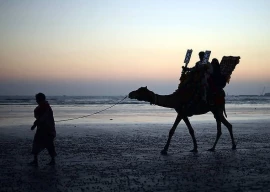
Eight new dengue cases were confirmed by health officials in Rawalpindi on Friday, bringing the total figure to 297 this year.
According to Rawalpindi District Health Department surveillance officer Dr Eshan Ghani, 63 dengue patients are currently admitted in various hospitals in the city.
A district official said on the condition of anonymity that a majority of dengue cases have been reported from cantonment areas, which he blamed on the water supply shortages in the area.
“Due to water shortages, residents store water in containers at their homes but don’t cover them properly. This provides breeding grounds to the dengue larva,” said the official.
He also said that 85 per cent areas in Rawalpindi have leaking water lines which create puddles and provide favourable breeding conditions for mosquitoes.

“The Islamabad and Rawalpindi city administrations are not ready to take responsibility to clear waste from IJP Road,” he said.
Meanwhile, poor sanitary conditions in many areas including IJP Principal Road, Shehzad Town, Chatha Bakhtawar, Tarlai, Rawal Town, Sabzi Mandi and Airport Road have also contributed to the spread of dengue fever.
The official also said that the Rawalpindi health department lacked a proper mechanism to gather information on the number of dengue patients and deaths.
“Many dengue patients visit private hospitals and clinics in the city, but the health department has no proper data about such patients,” he said.
Meanwhile, Islamabad Capital Territory Assistant District Health Officer Dr Najeeb Durrani said that a total of 47 dengue patients were treated in capital hospitals from September 1 to October 15 this year.
He said that out of the 47, six were residents of Islamabad — two from rural areas and four from urban ones, while majority of them were from Fateh Jang and a few from Mansehra and Rawalpindi.
“These six cases were treated at the Polyclinic and Pakistan Institute of Medical Sciences, while the rests were treated at Shifa International Hospital,” he said.
“Various health departments in the capital are making efforts to stem the dengue spread and around 180 medical staff have been trained for surveillance, mobilisation and other purposes,” he said.
Meanwhile, health experts have said that the dengue larva will continue to haunt the residents of twin cities as the civic authorities have failed to plug water leakages and dispose of solid waste.
“Simple fumigation or fogging at certain points is not enough and there is lot that needs to be done,” said an official from the Punjab government’s environment division.
Published in The Express Tribune, October 18th, 2014.



































COMMENTS
Comments are moderated and generally will be posted if they are on-topic and not abusive.
For more information, please see our Comments FAQ